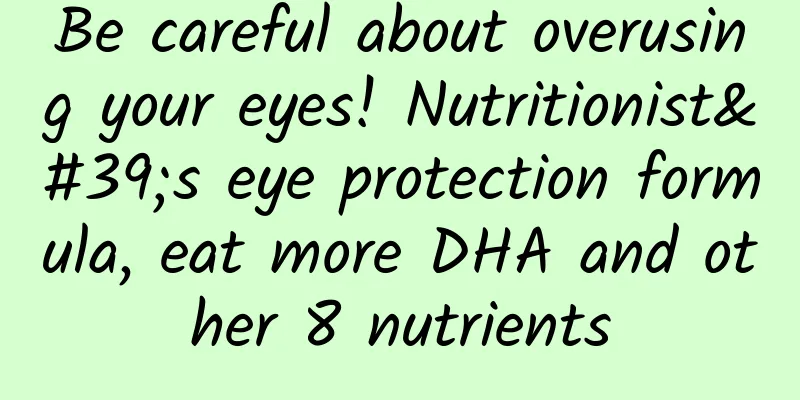Be careful about overusing your eyes! Nutritionist's eye protection formula, eat more DHA and other 8 nutrients

|
Eyes are the windows to the soul. Many people hope to have a pair of bright and clear eyes. However, excessive use of eyes, such as reading, scrolling on mobile phones, and watching TV for too long, causes problems such as excessive use of eyes, eye fatigue, and decreased vision. Therefore, in addition to avoiding prolonged use of your eyes and giving your eyes a rest regularly, you can also eat foods that are good for the eyes regularly to keep your eyes healthy! Nutritionist's Eye Care Nutrients1.DHA: An important component of the retina of the eye. It is an indispensable nutrient for maintaining eye health and helps improve visual acuity. 2. Protein: Protein is the main component of cells. The repair and renewal of tissues requires constant replenishment of protein. Severe protein deficiency will also affect the normal vision of the eyes. Protein is rich in foods such as lean meat, fish, shrimp, milk, eggs, and beans. Protein is rich in foods such as lean meat, fish, shrimp, milk, eggs, and beans. 3. Vitamin A: maintains normal visual function. The retina of the eye contains photoreceptor cells, among which columnar cells contain rhodopsin, which are responsible for receiving light stimulation and producing vision when the light is weak. Vitamin A is a component of rhodopsin. When it is deficient, it affects the regeneration of rhodopsin, and vision cannot recover quickly in weak light, which is night blindness. Sources of vitamin A are animal liver, milk and eggs, carrots and amaranth. 4. Vitamin B group: Participates in the metabolism of optic nerve cells and has the function of protecting the eyelids, conjunctiva and cornea. Whole grains such as brown rice, germ rice, whole wheat bread, as well as liver, lean meat, yeast, milk, beans, green vegetables, etc. are rich in B vitamins. 5. Vitamin C: Delays and prevents vision loss, cataracts and lens degeneration caused by aging, increases the toughness of the eye's tiny blood vessels and repairs cells, and improves eye health. 6. Vitamin E: Helps maintain the health of eye cells, blood circulation, and protect against certain eye diseases caused by aging, such as cataracts, age-related retinopathy, etc. Vitamin E is rich in vegetable oils, nuts, and wheat germ. Vitamin E is rich in vegetable oils, nuts, and wheat germ. 7. Anthocyanin: A type of flavonoid, it is related to the synthesis of rhodopsin. It can improve the eye's adaptation to darkness and light, maintain the health of the eye's capillaries, improve vision and reduce damage to the lens and retina. 8. Lutein: Protects the retina from oxidative damage, avoids age-related macular degeneration, and delays or prevents the occurrence of cataracts. This article comes from: Private words from nutritionist Juju |
Recommend
What is the normal progesterone level at 7 weeks of pregnancy?
The normal value of progesterone at 7 weeks of pr...
What are the nursing matters for dysmenorrhea?
Dysmenorrhea is one of the common diseases of wom...
Nori is a "vegetable in the sea" and is very nutritious! Supplementing iron and calcium to have a good complexion, "this" is more abundant
The black and purple seaweed is known as the &quo...
How much does cervical erosion surgery cost?
How much does the surgery for cervical erosion co...
All women have abnormal vaginal discharge
Abnormal vaginal discharge does not occur in all ...
What are the effects of uterine fibroids on women during pregnancy?
Uterine fibroids are a relatively common gynecolo...
What are the prevention methods of uterine fibroids?
Uterine fibroids are the most common gynecologica...
Can I use the air conditioner when I have dysmenorrhea?
If women experience dysmenorrhea during menstruat...
Can uterine fibroids be cured?
Can uterine fibroids be cured? Uterine fibroids a...
What are the specific criteria for the diagnosis of menopause?
Regarding the diagnostic basis of menopause, we m...
Medicinal diet suitable for patients with adnexitis
While receiving regular treatment, patients with ...
What tests are necessary for ectopic pregnancy?
Due to the gradual increase in the number of pati...
Healthy diet tips for patients with congenital absence of vagina
People should understand the symptoms of congenit...
Secondary dysmenorrhea is generally caused by five common factors
Secondary dysmenorrhea is generally caused by fiv...
Indications for negative pressure aspiration for abortion
Artificial abortion refers to the termination of ...









